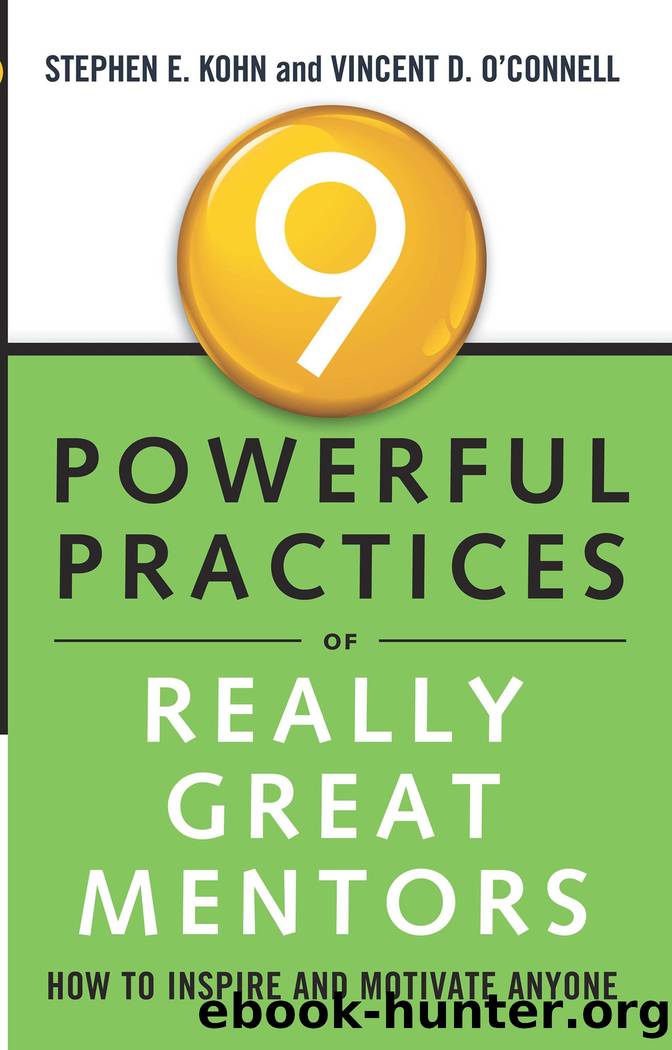9 Powerful Practices of Really Great Mentors by Stephen Kohn

Author:Stephen Kohn
Language: eng
Format: epub
Publisher: Red Wheel Weiser
Published: 2015-10-15T00:00:00+00:00
CHAPTER 7
Powerful Practice #2 of Really Great Mentors:
Initially, Explore Intrinsic and Extrinsic Motivation
Different protégés will have different motivations to engage in a mentoring relationship. Mentors can never begin a relationship with a protégé with presumptions about what the best outcomes will be for that individual. It is best to start with an open slate, and let the story unfold about just what the protégéâs motivation is to learn and receive guidance from you as a mentor.
Certainly, both immediate and longer-term goals are important for the mentor to identifyâat some point. But in the initial stages of the relationship, the focus should be on understanding what excites the protégé about his or her future prospects. This second powerful practice of mentoring demonstrates how to go about assessing and uncovering the motivational forces within protégés, which will have a significant impact on your mentoring approach.
Intrinsic motivation occurs when we act without any obvious external rewards. We simply enjoy an activity or see it as an opportunity to explore, learn, and actualize our potential. For example, you might be reading this book to explore, learn, and develop your potential as a mentor. Consequently, the motivation is to achieve the intrinsic rewards of learning to be as effective as possible performing in the mentoring role. But what if you were placed in a training group at work, and reading this book was mandatory? Then the reward for reading this bookâcompleting the training course and moving on from thereâis more extrinsically motivated.
Psychologists Richard M. Ryan and Edward L. Deci describe the construct of intrinsic motivation as an individualâs ânatural inclination toward assimilation, mastery, spontaneous interest, and exploration that is so essential to cognitive and social development and that represents a principal source of enjoyment and vitality throughout lifeâ¦[it is] the prototypic manifestation of the human tendency toward learning and creativityâ (Ryan and Deci 2000). Psychologists note that children show this human tendency to be intrinsically motivated early in their development. Then the âreal worldâ sets in and we tend to be motivated by a range of other factors: to comply with rules, abide by norms, earn sufficient income through supervised work, and so on. But it is clear that intrinsic motivation is the type that âproducesâ more. Comparisons between people whose motivation is authentic (they really want to learn new things!) and those who are merely externally controlled for an action (they learn because they have to) typically reveal that the intrinsically motivated have more interest, excitement, and confidence, which in turn is manifested through enhanced performance, persistence, and creativity (Deci and Ryan 1991; Sheldon, Ryan, Rawsthorne, and Ilardi 1997). For mentors, this should just be common sense.
If mentoring is about accelerating the protégé up the learning curve, then mentors are far more able to support rapid learning if their protégés are intrinsically motivated to explore issues or competencies, and are excited to develop their own potential. If they are involved in mentoring through the type of organizationally sponsored mentoring programs described in Chapter 3, then the rewards for participation may not necessarily be intrinsic.
Download
This site does not store any files on its server. We only index and link to content provided by other sites. Please contact the content providers to delete copyright contents if any and email us, we'll remove relevant links or contents immediately.
Hit Refresh by Satya Nadella(9122)
The Compound Effect by Darren Hardy(8941)
Change Your Questions, Change Your Life by Marilee Adams(7756)
Nudge - Improving Decisions about Health, Wealth, and Happiness by Thaler Sunstein(7689)
The Black Swan by Nassim Nicholas Taleb(7105)
Deep Work by Cal Newport(7063)
Rich Dad Poor Dad by Robert T. Kiyosaki(6603)
Daring Greatly by Brene Brown(6501)
Principles: Life and Work by Ray Dalio(6415)
Playing to Win_ How Strategy Really Works by A.G. Lafley & Roger L. Martin(6226)
Man-made Catastrophes and Risk Information Concealment by Dmitry Chernov & Didier Sornette(6002)
Big Magic: Creative Living Beyond Fear by Elizabeth Gilbert(5754)
Digital Minimalism by Cal Newport;(5747)
The Myth of the Strong Leader by Archie Brown(5496)
The Slight Edge by Jeff Olson(5410)
Discipline Equals Freedom by Jocko Willink(5378)
The Motivation Myth by Jeff Haden(5203)
The Laws of Human Nature by Robert Greene(5171)
Stone's Rules by Roger Stone(5080)
